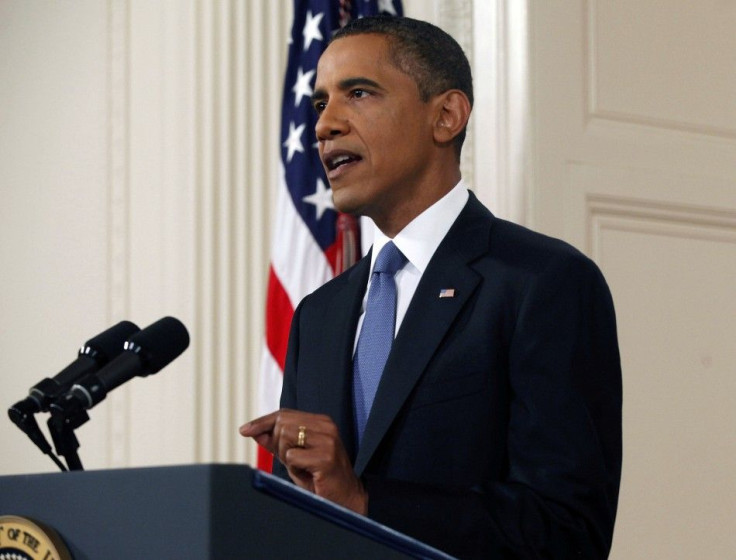Obama Approval Rating Dips: Can He Still Champion Needed Reforms?
ANALYSIS

Every economist, every public official -- whether it's President Barack Obama or House Speaker John Boehner -- and every political commentator has a world view or way of organizing the world around them.
Political scientists and other academics like to call it a paradigm, which is a fancy academic term for framework popularized by the great scholar Thomas Kuhn. Further, the paradigm for economy favored here is corporate capitalism.
True, at times it may not look like corporate capitalism is favored -- yours truly has been called many other things, economically, over the years -- but know that the paradigm favored is corporate capitalism.
Corporate Capitalism: The Best Economic System
Moreover, the view from here argues that corporate capitalism offers the most benefits for a society, with wealth creation, job creation, innovation, rising median incomes, increased productivity, reward for initiative, and resource utilization efficiency being chief among these.
But also know that the paradigm favored is a corporate capitalism with an adequate social safety net, or social welfare state - - something yours truly believes the U.S. never had, does not have today, but someday might.
Corporate capitalism with an adequate safety offers the benefits of both freedom and protection for the vulnerable. If one had to cite a model, it would be contemporary France, with a few modifications.
Further, President Obama, if he's successful with most of his initiatives -- universal health care being a big one -- and with getting the U.S. economy growing at a rapid rate again to create enough jobs, has a good chance to usher in a good, effective social safety net. Don't misunderstand: it won't be as good a safety net as France's, but Obama's programs can quite literally usher in a new, progressive era in American society and life. With a public approval rating that's dropped to 39 percent, according to the latest Gallup Poll, Obama will need some good fortune (and perhaps a continued decline in oil prices), to create the 150,000 to 200,000 new jobs per month (at minimum) the nation needs to help usher in that new era.
Reform: Essential for Systemic Health
But let's return for a moment, from an investor standpoint, to this notion of reform. Simply, economic reform enables the stakeholders to broadly structure change. That is an enormous advantage to both the stakeholders and the society at large. This is because history is replete with instances where just a minor amount of reform would have maintained the current stakeholders and saved the existing system...but, regrettably, it didn't occur. Two major examples, of course, are the French Revolution (1789-1799), and Bolshevik Revolution in Russia (1917).
In 18th century France, minor land reforms earlier would have prevented the rise of the radical Jacobins. None occurred, and the result was Robespierre and the Reign of Terror.
In the early 20th century, near the end of World War I, minor reforms by Czarist Russia - - again, so inconsequential when viewed in retrospect - - would have quelled dissent in Russia.
But none occurred. And the result was the rise of Lenin, the Bolsheviks, and the rule of the Communists. And Russia was filled with blood. Later, Josef Stalin would nearly destroy Russia -- destroy his own nation -- with his murderous mass purges -- the Red Terror -- and spread his brutality and Russia's errors throughout the world, filling the world with blood, for decades.
U.S.: Major Economic, Social Problems
Now, no one is suggesting that level of tumult in the U.S. But it is important to remember that so long as the stakeholders remain in control, they do shape the type of reform, to a considerable degree.
In other words, if the American system reforms now it is highly likely that it will remain corporate capitalist, and that's a good outcome for both U.S. investors and society.
Further, it's equally critical important to point out, as the French and Russian case studies demonstrate, that once turmoil starts absent reform, it's virtually impossible to predict how much harm will be done, what will occur, what system will rise, and where it will all end. Moreover, it is safe to say that those stakeholders in 18th Century France and in post-World War I Russia didn't begin to contemplate what was unleashed on their societies as a result of a failure to reform the existing system.
Some in the U.S., including many Tea Party faction members, economic conservatives and Republicans, say that despite growing social problems from unemployment, underemployment, and widespread deprivation, that the U.S. doesn't have to worry about such social upheavals - - that, for a myriad of reasons, the U.S. is different, immune, and/ or better. These observers also fail to see that, should Obama's reforms not stand, and the economic/social problems persist, another reformer who would propose changes far more society-altering than Obama, is likely to emerge. In other words, these mostly conservative observers say 'it can't happen here" or "a better safety need isn't needed."
That may well be the case. But given the enormity of what occurred in France and Russia, the balance of risks directs one toward not taking that chance. And that will always be the main reason forwarded here to back President Obama's much-needed economic reforms.
© Copyright IBTimes 2025. All rights reserved.





















